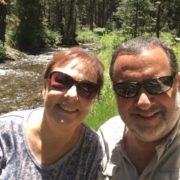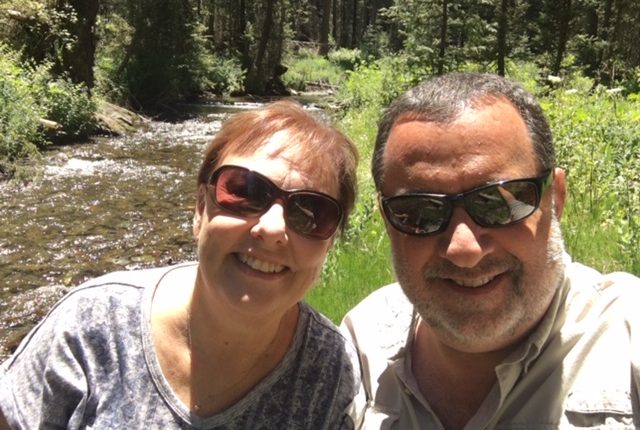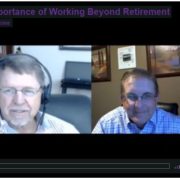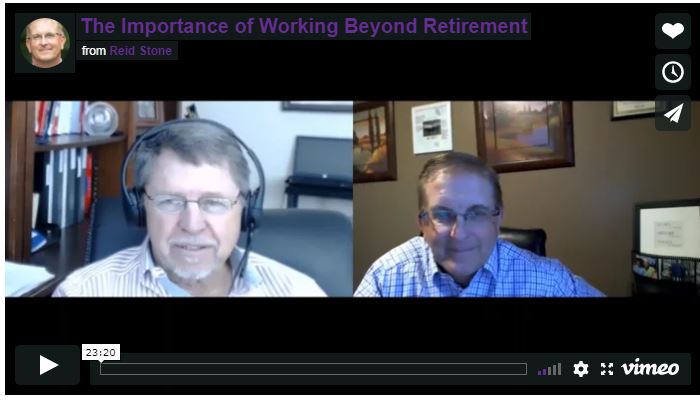Welcome to “Make Aging Work” – An Update

This past week, I finally got to a task that I’ve delayed for too long – an update to the “About” page on my website. So I’m grabbing a week to share the update with my blog readership. If you’ve been there, the change isn’t big. If you haven’t, I hope it will help put my vision/quest into clear perspective for you. and encourage you to stay along for, and contribute to, the ride.
///////////////////////////////////////////////
Welcome to Make Aging Work!
I think I know why you are here. You’ve blown past the 50-year threshold. You’re coming to grips with the fact that there are fewer days ahead than behind. There’s a growing uneasiness in the gut.
- Perhaps you are feeling unfulfilled, drifting, without a clear purpose for your life.
- Maybe you can sense that your 30-year career may soon be in jeopardy (merger/acquisition, youth movement, technology disruption, new management, etc.).
- Or even worse, that shoe has fallen and you are unemployed in a very tough job market for older workers.
- Maybe you are gainfully, safely employed but realizing that a dream of “traditional retirement” is out of reach because of poor savings habits or erosion of what you did accumulate and know that you are going to have to work beyond the “normal” working age.
- Or maybe you have wisely concluded that traditional retirement is a 20th-century relic, an unnatural occurrence in nature and a guaranteed path to a shorter, unfulfilled life. You want to “live long, die short”, healthy, productive and purposeful to the end.
- Maybe it’s the reality that a legacy and leaving a meaningful footprint is slipping away as the time horizon shortens.
- Or perhaps you are one of the few that has a healthy nest egg and have entered into “early retirement” and want to ignite your entrepreneurial fire, start your own business or in some other way continue to contribute and be of service.
 Hello, I’m Gary Allen Foster, executive recruiter, retirement and career transition coach, writer, and speaker.
Hello, I’m Gary Allen Foster, executive recruiter, retirement and career transition coach, writer, and speaker.
Believe me. Whatever category fits, you are not alone!
I’ve had the opportunity to work with folks in all of the above categories, all moving into and through the “third age” of life – that uncertain, uncharted space between middle-age (end of career and/or end of parenting) and true old age.
I’m an over-75 “portfolio career” guy. The father of two and grandfather of three, I’m approaching a golden anniversary with a wonderful lady who deserves more than what she got with me.
I escaped from rural Wyoming and traversed the country and several industries in various sales and sales management positions across 45+ years. I drank the traditional linear-life-model kool-aid in college. You know, the 20-40-20-year plan, of education, work/family and leisure that was – and still is – drilled into us by our parents, educational system, and the financial services industry – get a degree, get a job, get a family, get a house, get two cars, get a pension, get a gold watch, get a coffin.
My manufacturer colored me with a pretty deep attitude of skepticism and iconoclasm. On my journey – around my mid-forties – it led me to question this traditional linear-life concept, helped along by life experiences and the insights of the pioneers in personal development such as Earl Nightingale, Dennis Waitley, Brian Tracey, Tony Robbins, and others.
The message seemed consistent: those who lived the longest and achieved extraordinary levels of success, freedom, and contribution in their lives didn’t follow the “wisdom of the masses.” They were outliers who operated outside the traditional guideposts and never left the creative and contributory process.
This influence, some personal and professional experiences and my discomfort in the confining environs of corporate life led me to succumb to the allure of owning and running my own business at age 60 – a bit late for a major life transition, so says conventional wisdom.
I made a voluntary exit from a successful telecom sales career of 17 years to become an independent recruiter, a 15-year journey that has had more than its share of highs and lows.
Entrepreneur adventure
 The move to “entrepreneurship” was exciting and exhilarating with its freedom and control – for about six months! Then reality hit!
The move to “entrepreneurship” was exciting and exhilarating with its freedom and control – for about six months! Then reality hit!
I overestimated – as most aspirants do – my entrepreneurial skills and equally underestimated what it takes to start a small business, especially as a solo operator.
The recruiting business helped me, however, develop a deeper understanding of what makes others tick – or not. And it unveiled for me a passion and purpose that corporate life and the linear life indoctrination had covered over.
That passion is helping people find answers to difficult later-life questions. Not because I have all the answers. I’ve learned that everyone has the answers already inside and just need someone to help nudge them out.
My 75+ years of life and business experiences, along with a voracious appetite for reading all things involving personal growth, has helped equip me to be a catalyst to help people hatch the potential they have been roosting on most of their lives.
What’s your rulebook?
I’ve concluded we take life too seriously. And we play much of it with the wrong rules – rules from a societal/cultural rule book that brings us to “shoulda, woulda, coulda” thinking. Rules that are stacked against us being able to realize our full potential.
Nowhere does this become more apparent than when we reach that “over-the-hill” plateau of 50 and realize that we likely have more days behind than ahead.
Perspectives on lots of things begin to evolve, none more profound than the aforementioned classic “What is life and why am I here?” We fear what would be said – or not said – at our eulogy. We begin to accept that the weather will be the main determinant of how many attend our funeral. Our answer to the question “What is my legacy?” is way too close to “insignificant”.
A quixotic mission
 None of this may be important to you. But I’m guessing if you’ve read this far, something is resonating. My thing is perhaps a quixotic mission of helping folks over 50 adopt a new perspective on how to finish strong, to finish with purpose, to live longer, live better and live with purpose, to be willing to reinvent themselves. In other words, to Make Aging Work and Live Big and Age Little.
None of this may be important to you. But I’m guessing if you’ve read this far, something is resonating. My thing is perhaps a quixotic mission of helping folks over 50 adopt a new perspective on how to finish strong, to finish with purpose, to live longer, live better and live with purpose, to be willing to reinvent themselves. In other words, to Make Aging Work and Live Big and Age Little.
I help mid-lifers navigate a very tricky job market or to pivot their careers to something that is profitable as well as purposeful.
I help pre-retirees and early retirees avoid the pitfalls of an unplanned retirement and design a “third act” life filled with purpose and fulfillment.
I speak and write publicly to the issues of better health, greater longevity, and purposeful retirement because I believe we need to elevate our awareness of the aging process and be a stronger voice against the negative stereotypes of aging. And we need to stop allowing the deeply ingrained concept of “traditional, labor-to-leisure” retirement to take us down the path of mental, physical and spiritual deterioration that shortens our lives.
That’s the purpose behind this blog and the speaking I do on these topics.
Retirement or un-retirement? Landing or take-off?
 Shockingly, more than 50% of Boomers are financially unprepared to take traditional retirement. For those that can, 70% enter retirement with absolutely no non-financial retirement plan.
Shockingly, more than 50% of Boomers are financially unprepared to take traditional retirement. For those that can, 70% enter retirement with absolutely no non-financial retirement plan.
Fortunately, we are seeing a growing wave of “third-agers” who are more interested in “rewiring” than “retiring”, viewing their second half as a chance for another take-off, not a landing.
This site is intended to be a resource for finding answers to the myriad questions that arise as we move into what can be an exciting second growth period of our life.
Rough sailing ahead
Our demographic faces significant challenges ahead: a pervasive youth-oriented culture, rampant ageism, a horribly broken healthcare system, general healthcare illiteracy, government disarray, profit-driven corporate deafness, eroded retirement accounts and continued acceptance of harmful 20th-century myths about the aging process.
A collective voice
I believe strongly that the answers to these challenges lie in the collective knowledge, experiences, and wisdom of our demographic.
I want this site to be both a voice that you want to hear and a valuable resource that will help address these issues of health, longevity, “money and meaning” in later life, “purpose and profitability” in the second half, and intentional living to the end.
Your input, feedback, and requests for ideas, answers, and solutions are what will make it that.
I look forward to active engagement with you and becoming a valued resource.










